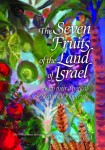Chana Bracha Siegelbaum is founder and director of the Midreshet B’erot Bat Ayin: Holistic Torah for Women on the Land. Located 20 minutes south of Jerusalem in the Gush Etzion community since 1994, its programs include monthly seminars for English-speaking women, experiential weekends and holiday studies based on a curricula emphasizing women’s spiritual empowerment through traditional Torah values. The rebbetzin also tends an orchard of 50 fruit trees, and she has recently published The Seven Fruits of the Land of Israel (Menorah Books, 2014).
Danish-born Siegelbaum wrote this cookbook over 17 years, and it features more than recipes – it includes the mystical and medicinal properties of the seven species. For each of the species, mentioned in Deuteronomy 8:9-10, there are other biblical sources. Siegelbaum offers for each species an attribute, character trait, holiday, weekday, world, body parts, shepherd, prophetess, numerical value, how often it is mentioned in the Bible and the meaning of its Latin name. After this are nutrition facts, medical associations, kabbalah references, recipes, a story and general references.
The book is compiled and expanded from the rebbetzin’s yearly workshops, and “the Torah teachings carry the main weight of the book, as Torah is [her] passion and training.”
Siegelbaum writes that the seven fruits of Israel affirm the G-d of Israel, the people of Israel and the land of Israel. Wheat is soft and sweet; barley, tough and hard; grapes are succulent and deliciously juicy; figs are plump and fleshy; pomegranates are tangy, vibrant and crunchy; the bitterness of olives contrasts with the honeyed sweetness of the dates.
After completing the text of the book, which took more than 15 years, Siegelbaum then spent a year working with the graphic artist and fine-tuning it. Jessica Friedman Vaiselberg, who created the illustrations, is originally from Kentucky; she studied at the Memphis College of Art and graduated from the University of Louisville. She and her family live on Long Island, where she has a home studio.
Not only is The Seven Fruits of the Land of Israel a fascinating book, but there are 162 color photographs to enhance the work, a summary chapter, three appendices and essays about the author, the artist and the Midreshet, as well as numerous illustrations and paintings.
Special touches to the book include border illustrations of each species, color-coded to match the species – for example, the use of a grape color for the grape chapter, green for barley, etc. Additional illustrations are on the bottom of each page.
There are 67 recipes, many unique, including wheat burgers, wheat-germ brownies, baked barley, barley beet salad, chocolate grape leaves, Rambam’s charoset, fresh fig spread, quinoa pomegranate almond delight, anti-wrinkle pomegranate-feel facial cream, flavored olive oil, Moroccan-inspired cooked olives, dream of date balls and guilt-free chocolate mousse pie.
Even though the rebbetzin leaves out the number of servings, her styling includes the things that I always find most useful – a little comment, numbered instructions and a separation of ingredients from instructions, in this case, in a shaded box.
The Seven Fruits of the Land of Israel was awarded the 2015 Gourmand World Cookbook Award in the best Jewish cuisine category and in the best cookbook fruits category. Here are a couple of recipes from it.
TENDER POMEGRANATE TABOULI
1 cup cracked wheat (bulgur)
1 bundle finely chopped parsley (about 2/3 cup)
1 bunch finely chopped mint or 1/2 cup dry
1/2 cup finely chopped green onions or scallions
1/2 cup pomegranate arils
1 finely chopped cucumber
juice of 2 lemons
2 tbsp olive oil
sea salt to taste
freshly ground black pepper to taste
allspice to taste
1. Pour boiling water over cracked wheat.
2. Soak cracked wheat in water for at least one hour. Pour out extra water.
3. Soak the parsley, green onions and mint in natural soap water for three minutes. Rinse.
4. Process parsley, green onions and mint in a food processor until very fine.
5. Mix finely chopped herbs and onions with the soaked bulgur.
6. Add the pomegranate arils and chopped cucumber.
7. Pour juice of the lemons on the tabouli and add the olive oil, salt, pepper and allspice.
OLIVE WALNUT SPREAD
1 can of pitted green olives (1/4 pound)
4 garlic cloves
1/2 to 1 cup walnuts
1/4 cup extra virgin olive oil
1. Puree olives, garlic, walnuts and olive oil in a food processor. Serve as a dip.
Sybil Kaplan is a journalist, foreign correspondent, lecturer, food writer and book reviewer who lives in Jerusalem. She also does the restaurant features for janglo.net and leads weekly shuk walks in English in Jerusalem’s Jewish food market.

